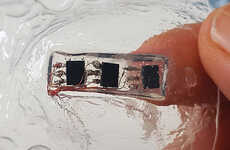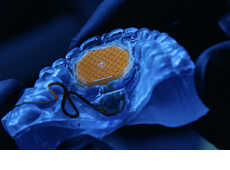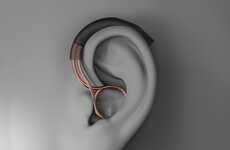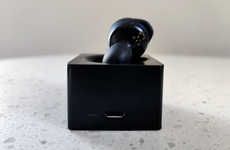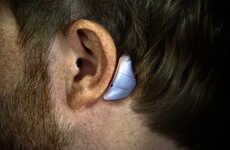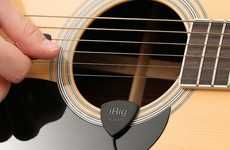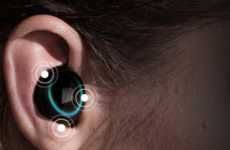
This Mouth Hearing Aid Transmits Words By Buzzing Users' Tongues
Rahul Kalvapalle — January 19, 2015 — Tech
References: source.colostate.edu & gizmag
Researchers at Colorado State University are developing a mouth hearing aid that is effectively an electric retainer that transmits spoken words to users -- by buzzing their tongue. The device is an alternative to cochlear implants that are very expensive, have to be surgically installed and do not work on all forms of hearing loss.
The device uses a microphone-equipped earpiece to pick up sounds before converting them into electrical signals. These signals are then sent via Bluetooth to the retainer, which the user holds on their mouth. When users press their tongue against the device, the electrodes in them selectively stimulate specific parts of the tongue.
Users can be trained to associate specific patterns of tongue stimulation with given words. Since the tongue contains thousands of nerves, it is believed that this system could be used to help people with hearing impairments to process complicated words and information.
The device uses a microphone-equipped earpiece to pick up sounds before converting them into electrical signals. These signals are then sent via Bluetooth to the retainer, which the user holds on their mouth. When users press their tongue against the device, the electrodes in them selectively stimulate specific parts of the tongue.
Users can be trained to associate specific patterns of tongue stimulation with given words. Since the tongue contains thousands of nerves, it is believed that this system could be used to help people with hearing impairments to process complicated words and information.
Trend Themes
1. Electric Mouthpieces - Developing mouth hearing aids that transmit spoken words to users through electric mouthpieces provides a new disruptive innovation opportunity for hearing aid makers.
2. Tongue Stimulating Technology - The use of tongue stimulating technology to encode and decode messages to help people with hearing impairments process complicated words and information presents a new disruptive innovation opportunity for biomedical engineers.
3. Alternative to Cochlear Implants - The development of an alternative to cochlear implants provides a disruptive innovation opportunity for manufacturers of hearing aids, especially those that are less expensive, easy to use, and work on all forms of hearing loss.
Industry Implications
1. Hearing Aid Manufacturing - The hearing aid manufacturing industry can capitalize on these trends by investing in R&D projects to produce electric mouthpieces and tongue stimulating technology.
2. Biomedical Engineering - The biomedical engineering industry can take advantage of this trend by developing new technologies that encode and decode messages to help people with hearing impairments process complicated words and information.
3. Healthcare - The healthcare industry can benefit from this trend by offering patients with hearing impairments non-invasive, less expensive, and less painful treatments, such as electric mouthpieces and tongue stimulating technology, which are also more versatile and easier to use.
6
Score
Popularity
Activity
Freshness


